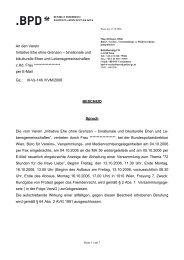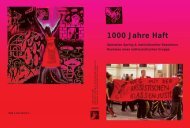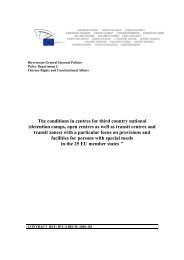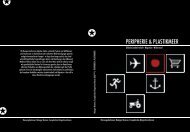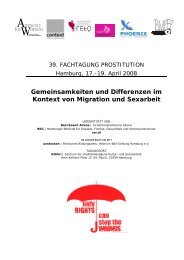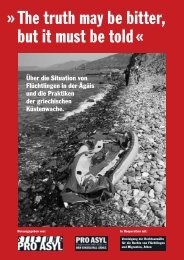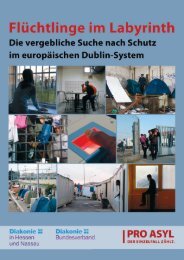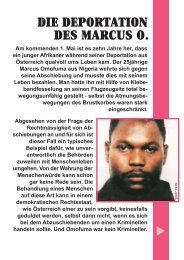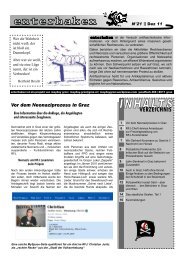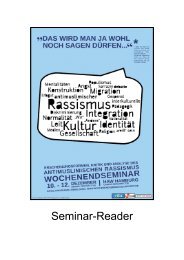Turin's CIE - International University College of Turin
Turin's CIE - International University College of Turin
Turin's CIE - International University College of Turin
Create successful ePaper yourself
Turn your PDF publications into a flip-book with our unique Google optimized e-Paper software.
how time constraints can pose a massive obstacle for any lawyers who are attempting to<br />
provide good representation for their clients: “We are not informed by the public administration<br />
when we are appointed by detainees, or we realise it at the hearing where we discover that we are<br />
nominated as their personally appointed lawyer [avvocati di fiducia]” (Interview 5).<br />
3. VISITS<br />
Although there is usually one room allocated for lawyer-client interviews, maintaining privacy<br />
and respectful conditions is still a concern, especially where many lawyers come to visit their<br />
respective clients at the same time 131 :<br />
“Originally the room had a fully closed door and the personnel, including Polizia di Stato 132 ,<br />
Carabinieri, Guardia di Finanza and Alpini 133 , <strong>of</strong>ten kept the door open for security<br />
requirements, until the door was taken <strong>of</strong>f. Today the interview takes place under<br />
conditions <strong>of</strong> confidentiality and pr<strong>of</strong>essional secrecy for lawyers, with visual and auditory<br />
monitoring: there is a window in the door so as to see inside the interview room”<br />
(Interview 4);<br />
“Sometimes, when there are other lawyers waiting to meet there clients, interviews can<br />
take place in another room but in this case we have to leave the door open” (Interview 8);<br />
“The place for interviews is really very bad. It is overcrowded. There is no respect. If you go<br />
inside a prison, and there the conditions are really not good- particularly nowadays in Italy<br />
they are overcrowded, at least [in prison] the places where you speak with a person are<br />
clean. There are enough chairs, enough places and you have some hours when you can<br />
enter. This is okay, this is to maintain order. But the person is respected. [In prison] [t]he<br />
place I need to speak with a person is respected. I am okay, we have a window. It is clean. I<br />
can put my stuff on the desk without thinking that this is dirty” (Interview 7).<br />
70 | P a g e<br />
4. COMMUNICATION<br />
Another important problem highlighted by the interviewed lawyers concerned barriers to<br />
communication. Whilst Italian law provides for interpreters during the actual validation and<br />
extension hearings 134 , there is no law that guarantees any pr<strong>of</strong>essional interpreting service for<br />
client interviews inside <strong>Turin</strong>’s <strong>CIE</strong>. The lack <strong>of</strong> interpreters can be a significant impediment<br />
because our research suggests that at times neither the lawyer nor the client can fully<br />
comprehend what each other is advising or disclosing. No state-funded telephone interpreting<br />
service is provided for these consultations either. As one lawyer explained:<br />
“Interpreter? The language problem is an important issue, almost crucial. It is not that<br />
different from what actually happens in prison. In the latter case the lawyer should<br />
nominate a technical consultant, such as an interpreter. This procedure usually turns out<br />
to be complex and tough in its application so in the end it’s not really implemented.<br />
Obviously, at the <strong>CIE</strong> this procedure does not exist but it might be practicable to ensure<br />
131 For further information on the conditions and waiting times for visiting detainees, see Part B. Conditions <strong>of</strong><br />
Detention, Chapter II. Family Relationships, Children and <strong>CIE</strong>, 6. Visits and Part C. Judicial and Legal<br />
Processes, Chapter X. The Role <strong>of</strong> Embassies and Consulates in the Identification Procedure.<br />
132 The Polizia di Stato is one <strong>of</strong> the five Italian police branches. It is a civil police branch under the authority <strong>of</strong><br />
the Department <strong>of</strong> Public Security <strong>of</strong> the Ministry <strong>of</strong> the Interior. Its main function is maintaining order and<br />
ensuring public security.<br />
133 The Alpini are the mountain troops <strong>of</strong> the Italian army.<br />
134 Decreto Legislativo 286/1998, article 14.4.




